Drone Industry
Discover how additive manufacturing can be a game-changer for your drone project!
- Innovation
- Adaptability
- Scalability
How can 3D printing benefit the drone industry ?
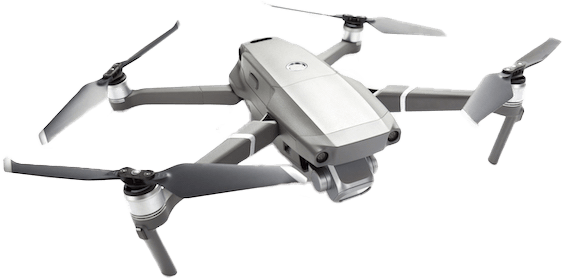

Login
If you have any trouble logging in to your account, contact us.
Sign Up
To start 3D printing or Laser Cutting, you'll need to create an account here. Once done, you'll be able to upload your files and get live quotes of yours parts
Already have an account? Log In
Discover how additive manufacturing can be a game-changer for your drone project!

Home » Industries » 3D Printing for Drones » 3D printed drone frame: Prepare for takeoff
Drones or UAV technology for Unmanned Aerial Vehicles are now used for various purposes and in many industries. Over the last few years, drone growth has been quite impressive. This flying engineering device is now used for most technical applications! Indeed, the opportunities offered by drones are endless; from agriculture, construction and mining, insurance, and media and telecommunications, drones are now everywhere.
Additive Manufacturing is starting to play an essential role in the drone industry, offering new innovative manufacturing opportunities, helping to reduce cost and improve the quality of these devices.
Among the many parts 3D printable drone parts, the most central one will is worth discussing: The drone frame. Let’s see the benefits of 3D printing a drone frame, which material you should choose, and more importantly, we will see how Sculpteo’s 3D printing service can help you reach your goals!
Drones and additive manufacturing are a perfect match!
Drones are increasingly attractive for numerous sectors, but the problem is that a traditional drone can be costly if you want a high-quality device. Moreover, if you buy a conventional and standard drone, it may occur that the quadcopter you selected isn’t adapted to your project. Getting a custom-made drone allows benefiting from the exact features you need.
You might often hear that additive manufacturing is a perfect manufacturing technique. When it comes to drone frame manufacturing and drone manufacturing in general, it is true. Using additive manufacturing is a massive asset for a rapid prototyping process. Feel free to work on the structure of your drone and make as many iterations as you need: this will give you the space to innovate and test your new ideas without taking significant risks.
With the short lead times of this manufacturing technique, you will save time on your product development process.
Creating lightweight parts has become essential for many industries, such as automotive or aeronautics. Keeping a light structure helps to optimize the final product, and weight optimization is one of the most regular requirements.
Lightweight parts are also a massive advantage for the drone industry. Weight is quite crucial for a flying device. Additive manufacturing allows innovation in terms of design, from hollowed parts to exciting structures such as lattices. This is true for all your drone parts, and obviously, it is true for your drone frame.
Rethinking your drone frame’s structure can result in a significant weight reduction. Design for Additive Manufacturing allows for completely innovative structures that can change how drones and drone frames are made. The result? A lighter, more robust, more functional drone!
While manufacturing an automated electronic device, you need to manufacture several parts working and interacting together: for drones, robotics, and electronics, additive manufacturing offers numerous advantages.
A drone frame is a central component in your drone, where all the other components might be attached. Adding integrated features directly connected to your drone frame is possible, meaning you don’t have to print these parts and elements separately.
Using 3D printing is an opportunity to create complex designs and geometries, impossible to create with traditional manufacturing technologies such as CNC machining or injection molding. Additive manufacturing allows printing fully assembled parts, which can be a significant advantage for your whole process, as it is a way to save time by shortening the assembly process, reducing the number of components, and also reducing weight.
With additive manufacturing, you can create the project you need, not the project you can. 3D printing allows you to design according to your products and projects, not according to stock fittings. Do you need a new innovative feature for your drone which requires perfectly adapted parts? Feel free to test and iterate your connectors or mounts, thanks to the short lead times and flexibility offered by 3D printing.
Rather than maintaining an inventory of drones or drone parts, it is possible to use digital manufacturing services and produce any number of parts when needed.
This advantage is mainly for people willing to manufacture a series of parts, but maintenance management can also be optimized by additive manufacturing. You don’t have to worry about an entire stock of spare parts; you should invest your energy in creating a digital inventory that will improve your maintenance and risk management! On-demand manufacturing can be used to produce spare parts when you need them.
Are you creating drones based on specific customers’ expectations and requirements? In this case, you might need to build drones with particular parts and features. Customization is costly while using traditional manufacturing methods such as injection molding. But with 3D printing, it is way easier. For small series, 3D printing will be a cost-saving technique, as you can print the exact amount of parts you need.
Thanks to additive manufacturing, it is possible to create drones perfectly adapted to your projects. The design can be optimized and customized to fit all your needs. Each drone you make can be adapted to its future application.
3D printing is helping you to shorten your lead times. Don’t wait any longer; get your parts in just a few days. Compared to a manufacturing technique such as injection molding, where making molds and manufacturing the actual part takes weeks, additive manufacturing allows you to get your parts printed in just a few days.
Benefit from a quick iteration process. Speed up your iteration process and your whole product development process using additive manufacturing.
3D printing is now offering advanced surface finishes for your 3D printed parts. Get a finished look with UV protection, depending on your chosen finish and the area.
The additive manufacturing industry is now developing high-performance materials adapted to the most demanding applications. Sculpteo and BASF are joining their efforts to offer you the best 3D printing material selection for your technical projects, from drones to robotics or electronics.
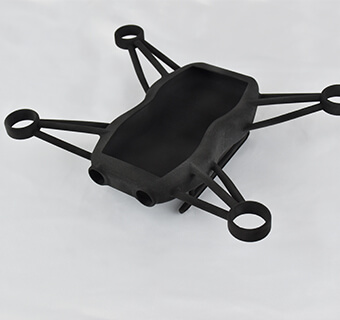
Many different materials for your drone frame or any drone part:

The start of any 3D printing project is the same: you must get a 3D model to 3D print it. In this case, we recommend using an STL file.
To get this file, you have several options. The best one is to create your design using the CAD software of your choice. If you don’t have the design skills to do so, our Design Studio team can help you with your project.
If you want to 3D print an already made drone frame, you also have some options. For example, Thingiverse is offering an attractive 3D model of drone frames. You just have to download your drone frame STL and re-use it for your drone project.
Once you got your 3D drone frame STL, it is time to 3D print it! Finding a reliable drone manufacturer able to 3D print your project using adapted material with professional quality can be complex. At Sculpteo we have the experience and the technologies to help your business grow and face new challenges. For more than ten years, Sculpteo has supported businesses in various industries to make the most of 3D printing. Drone manufacturing is not an exception, and we know we can partner with your company to bring you further using innovative manufacturing.
More generally, 3D printing is a perfect manufacturing alternative for drone parts. And our customers understood it!
Sculpteo’s 3D printing service is known for collaborating with some drone industry leaders. Here is a selection of great drone projects using 3D printing.
Get inspired by these additive manufacturing projects.
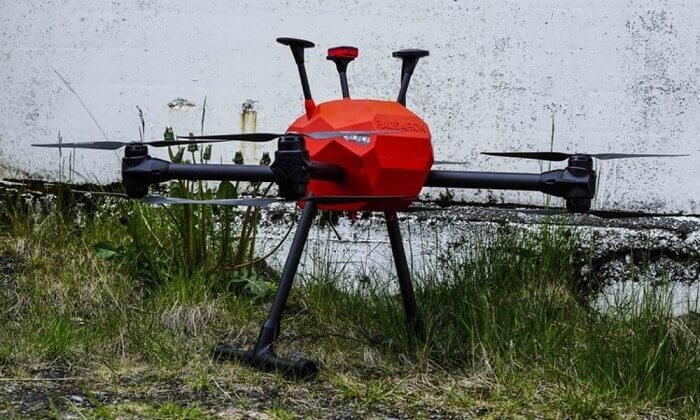
Svarmi started working on several projects including 3D printing to discover the full potential of the additive manufacturing technology. After that they started developing a 3D printed drone which appeared to be a great successt. The number of components was reduced by a factor of almost 6 and the time to assemble the drone went from being almost two weeks to two days including all the soldering required. The total weight of the drone was also reduced by a factor of 20%.
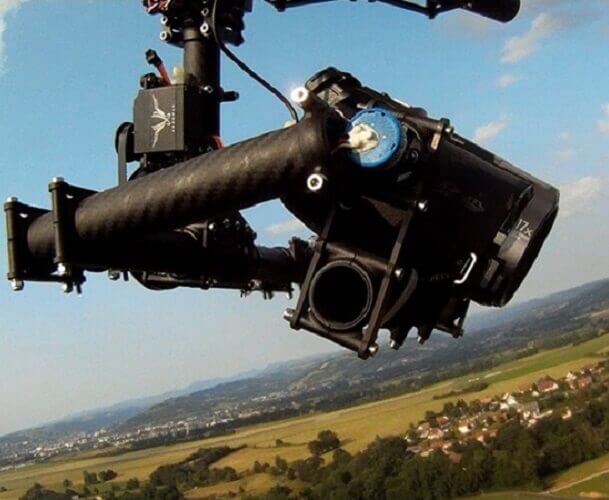
Hexadrone realized very quickly when designing their drone that the necessity for customization, functionality, and fast time-to-market were essential features for the success of their drones. They used 3D printing to create a frame and made the most of integrated assembly.
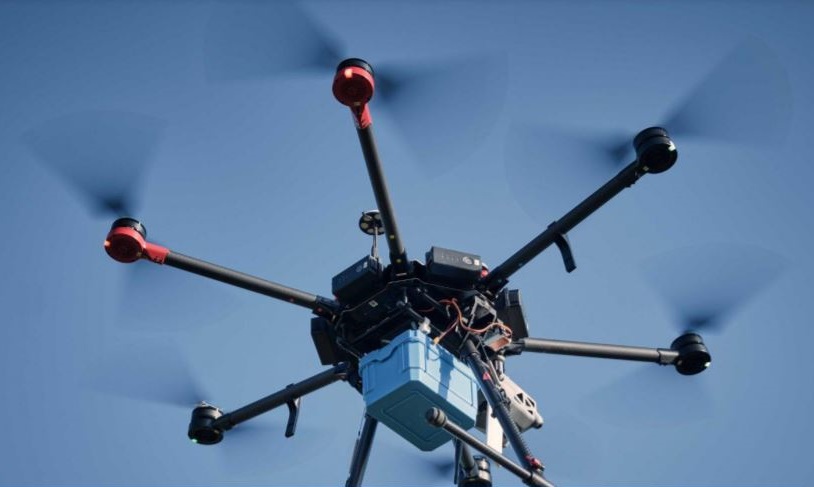
The cargo drone project aims to provide a low-cost add-on module for consumer drones for cargo transport purposes. With minimal time investment and a professional quality and surface finish, WeRobotics could meet all of its manufacturing requirements and still be cost-effective thanks to Sculpteo.
Do you have a drone project in mind? Upload your 3D model now and 3D print your own unmanned aerial vehicle, or some drone parts! If you want more information to 3D print your drone, don’t hesitate to contact us.
Get the latest 3D printing news delivered right to your inbox
Subscribe to our newsletter to hear about the latest 3D printing technologies, applications, materials, and software.
 Connect with Google
Connect with Google Connect with Facebook
Connect with Facebook